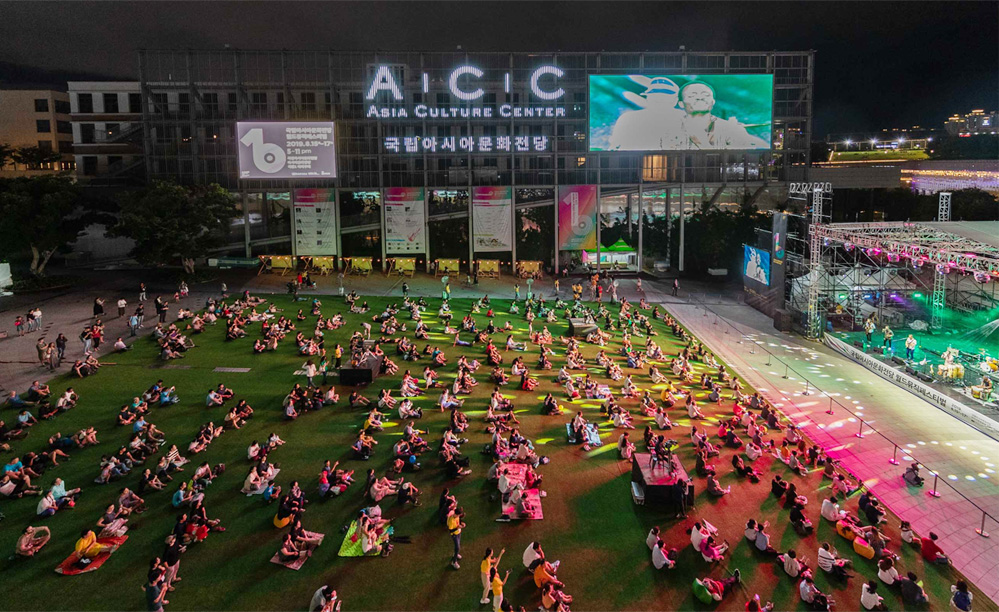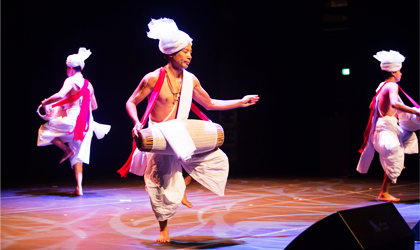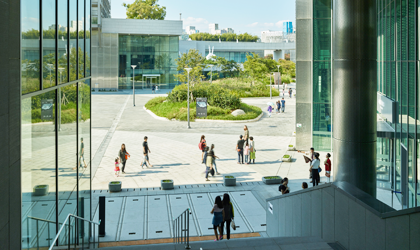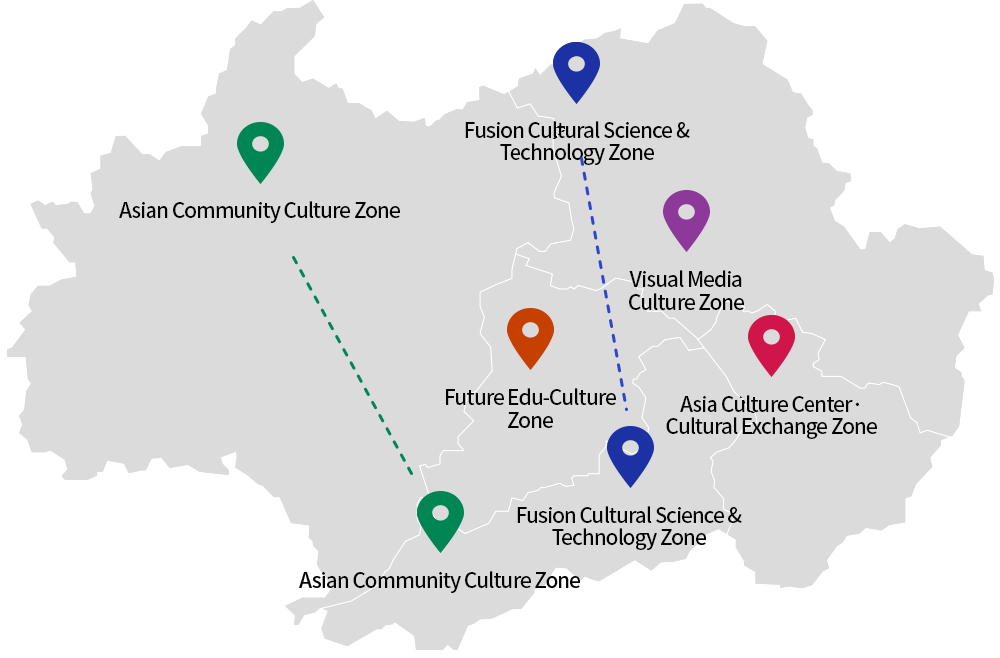건너뛰기 링크
주메뉴 및 상단메뉴
Culture to the World :
Hub City of Asian Culture
Gwangju
본문 및 주요 콘텐츠
Vision

Asia's cultural
window to the world
- Asia's Cultural Window to the World
Joining Asian Hands in Culture as the World Awaits Us - The goal of Hub City of Asian Culture Project is to establish in Gwangju a city where the cultural resources of Asia are exchanged, created, trained, and shared, built upon the vast diversity and creative prowess of participating countries. The Project's larger vision is to contribute to enhancing the overall quality of life of Asians, and more, to promote continent-wide development and joint prosperity.
Policy Objectives
- City of Asian Cultural Exchange
- The City will be a cosmopolitan forum of exchange in which the diverse cultures and communities of Asia coexist and share symbiotic relationships. Such international exchanges shall form an integral part of the lives of the Asian population.
- City of Asian Arts and Peace
- Butressed by the values of democracy, human rights, and peace, combined with creative imaginations, the arts and culture shall serve as medium in upholding the values of peace and freedom in this City.
- City of Culture-based Economy
- Every aspect of a community's cultural life become an article of commerce. The City will feature a next-generation town that fosters a high value-added economy leveraging culture as its growth engine
Basic Concepts and Direction
-

Asia's Cultural Window to the World
-

Hub city of Asian Culture, Gwangju
- Foundation: Culture City
- Urban sprawl resulting from modernization, environmental disasters brought on by global warming, and the like are serious problems common to Asians today. One solution to such problems can be offered by this "Culture City.“
- Contents: Asian Culture
- The world is sharply focusing its eyes and ears on the continent of Asia which is home to half of Earth's population and accounts for half of the global production. By rediscovering the cultural diversity and values of Asia where scores of ethnic groups, religions, and cultures collide, intersect, and come together with one another, the process can serve as a springboard to realizing Asian co-prosperity.
- Direction: Forum for Communication and Exchange
- The Silkroad demonstrates how actively Asians long ago were involved in mutual communication and exchanges. By investigating and shedding light on the wide spectrum of Asian culture and building a network among cultural organizations/individuals in Asia, a forum can be created to reinvite the lively communications and exchanges of the past.
The Four Missions
1. Establish and operate the Asia Culture Center(ACC) as production center for cultural contents
The Asia Culture Center is a multi-functional cultural facility where diverse cultural assets of Asia are leveraged to feature exhibitions, performances, education programs, research work, and creative activities, through which the general public and artists engage in exchanges and inspire one another in the creative artistic process. The creative energy of the Asian cultural contents produced in this manner shall radiate not only in Gwangju and Korea, but shall diffuse itself throughout Asia and the rest of the world
2. Develop a culture-based urban environment
Under the overarching goal of achieving phase-by-phase development and growth of the HCAC, the Project will endeavor to create "cultural belts" with a circulatory mechanism throughout the entire city. With the ACC at the heart, the city, through cultural regeneration, will be divided into five Culture Zones based on key functions to ensure that the cultural energies of the city are relayed ceaselessly.
[Hub city of Asian Culture 5 Culture Areas]

- Asia Culture Center·Cultural Exchange Zone
The germination point where the cultural energy of the city is circulated, accumulated and reproduced in close connection with the Asia Culture Center Old downtown areas, such as May 18 Democracy Square, Chungjang-ro Street, and Geumnam-ro Street, Nam-gu Yangnim-dong area, Gwangju Park
- Fusion Cultural Science & Technology Zone
The space for the cultural technology and contents industry integration that scientifically researches and excavates the various values of Asia Gwangsan-gu Bia-dong area, R&D special zone, Songam·Hanam·Sochon Industrial Complex
- Asian Community Culture Zone
The space that creatively succeeds traditional culture that inherits Asian cultural style and principles Nam-gu Chilseok·Daechon·Hyocheon Area, Pochungsa Shrine, Wolbongseowon Confucian Academy Area
- Future Edu-Culture Zone
The space for future innovative culture and art education that intensively infuses and realizes the value and philosophy of education culture Seo-gu Mareuk-dong Area
- Visual Media Culture Zone
The space for interactive media culture that represents Gwangju with advanced media technology Jungoe Park area
3. Promote arts and culture/tourism industries
The Project aims to nourish the artistic strengths of the City, and funnel in resources to promote the top five cultural contents businesses including music, crafts & design, games, hightech images, and edu-tainment, to further grow them into cultural & tourist industries.
5 Culture Areas
Asia Culture Center
- Intensively foster the 5 core contents on cultural industry
- Activation of local tourism
- Basic arts promotion
4. Heighten the City's status and reinforce its cultural exchange function
Hub City of Asian Culture is to be a forum in which different aspects of all the coexisting cultures of Asia are shared. The general public will naturally be exposed to such cultural openness and acquire a deeper sense of appreciation of Asia and its constituent cultures. To build this "city of cultural exchange," a network of international dimensions whereby culture bonds the people of Asia will be fostered.
City Dimension
The Heart of Asia Cultural Exchange
- Establish network with governments in Asia
Ministry of Culture, Ministry of Foreign Affairs and cultural organizations from Asian countries
National Dimension
Creative and Open Cultural Nation
- Establish network with international organizations
UNESCO, ASEAN+3, APEC, UN-WTO, etc
Asia Regional Dimension
Interacting Cultural Community
- Establish network with culture and art organizations
Biennale in Asia, international associations of art genres, etc.
- Establish network with non-government organizations
NGOs related with Democracy·Human Rights·Peace
Effects
1. For the general Public
The people will be able to relish a higher quality of life by embracing culture in their daily lives and also unleash their artistic potential through training programs. In addition, they will be given greater opportunities for self-realization by offering themselves to a variety of jobs that will be created with the execution of the HCAC Project.
2. For the city
High quality human resources from throughout Asia are expected to converge upon the City. Bustling with cultural activities for the public and active cultural exchanges, the City will experience revitalization of the local economy with this significant growth in social capital.
3. For the state
The state will be able to derive a model of balanced national development by means of culture, and forge an identity of openness required of a culturally pluralistic society. For Korea, the country is expected to step on to new dimensions with its status enhanced within the Asian community.
4. For Asia
The Project aspires to promote the great diversity of cultures in Asia and establish a model of sustainable development by capitalizing on the cultural resources of each state in the continent. Furthermore, by fostering exchanges and interaction, it is hoped that trust and peace among all countries are built to last.
5. For the world
An in-depth appreciation of Asian cultures by people all over the world will reveal the truly unique values of Asia. The Project pursues solidarity and networking at the international level with a view to overcoming the limitations of modern civilization.
Expected effect of urban development in 2023
 Individual
Individual- Quality of Life
- Individual's Culture Potential
 Region
Region- Social Capital
- Human Resources
- Local Economy
 Nation
Nation- Balanced National Development
- Open Identity
- Cultural Competence
 Asia
Asia- Cultural Diversity
- Substainable Development
- Mutual Trust & Peace
 Global
Global- Understanging & Discovery of Asian Culture
- International Networking

